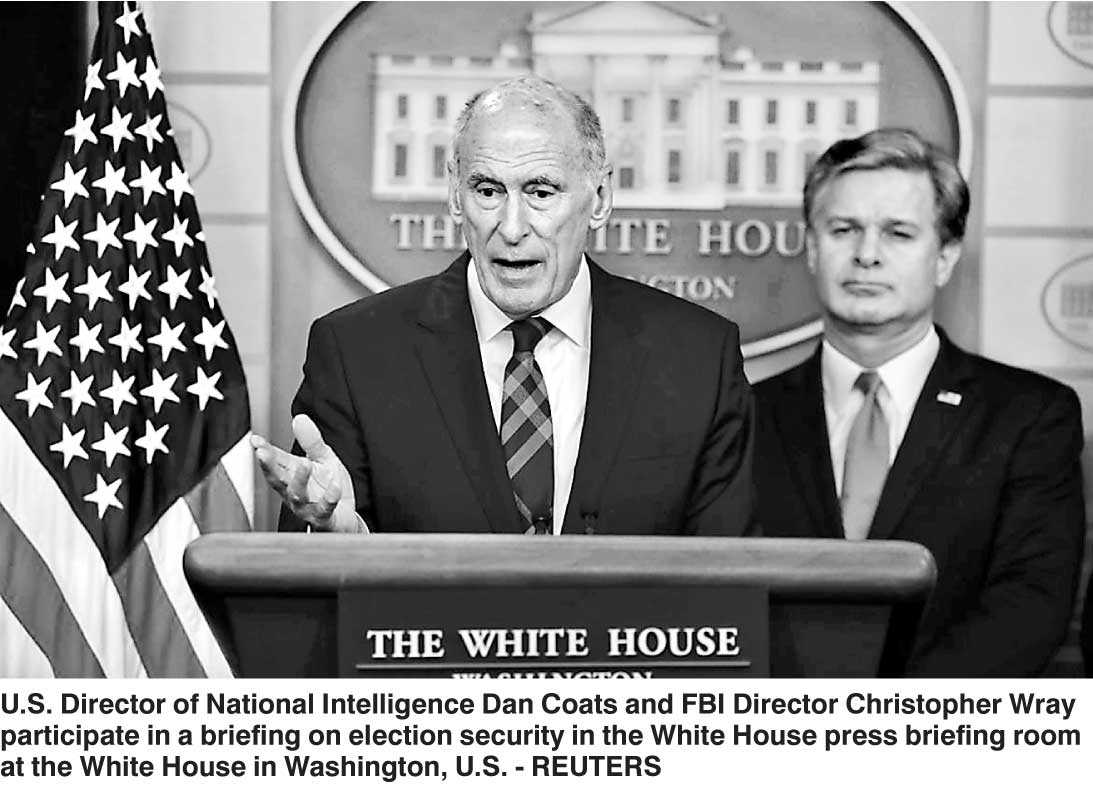Wednesday Mar 04, 2026
Wednesday Mar 04, 2026
Saturday, 4 August 2018 00:10 - - {{hitsCtrl.values.hits}}

WASHINGTON (Reuters): US President Donald Trump’s national security team said on Thursday that Russia is behind “pervasive” attempts to interfere in upcoming US elections, in a rejection of denials of meddling that Russian President Vladimir Putin made directly to Trump.
The top aides, including intelligence director Dan Coats and national security adviser John Bolton, appeared in the White House briefing room to stress that a major effort was under way to protect the integrity of congressional elections in November and the 2020 presidential election.
“We acknowledge the threat, it is real, it is continuing, and we’re doing everything we can to have a legitimate election,” Coats said, adding: “It is pervasive, it is ongoing, with the intent to ... drive a wedge and undermine our democratic values.”
Trump has voiced scepticism about Russia’s role in US election meddling, drawing accusations from Democrats and Republicans alike that he is ignoring a threat to American democracy.
“I have great confidence in my intelligence people, but I will tell you that President Putin was extremely strong and powerful in his denial today,” Trump said after talks with Putin in Helsinki, Finland, on July 16.
But Coats, Bolton, FBI Director Christopher Wray, Homeland Security Secretary Kirstjen Nielsen and the director of the National Security Agency, Paul Nakasone, said Russia was to blame, along with other foreign actors.
Coats said the Russian meddling effort reached into the Kremlin itself. He gave no details.
“Russia has used numerous ways in which they want to influence, through media, social media, through bots, through actors that they hire, through proxies - all of the above, and potentially more,” he said.
“We also know the Russians tried to hack into and steal information from candidates and government officials alike,” Coats said, adding that Russia was not the only country working to undermine American elections.
Separately, US Defence Secretary Jim Mattis told reporters that the Pentagon was also assisting in efforts to safeguard US elections. He said the Department of Defence was “taking active measures to protect election security including monitoring our adversaries.”
Democrats sceptical of the Trump-led effort to protect the elections said they were glad there was now a focus on it. Trump held a National Security Council meeting on the subject last Friday and Bolton sent a letter to Senate Democratic leaders to describe the effort.
“Glad to see the White House finally do something about election security – even if it’s only a press conference. Now if only it was actually backed up by anything the President has said or done on Russia,” US Senator Mark Warner, a Virginia Democrat, said in a tweet.
Senate Democratic leader Chuck Schumer said Bolton’s letter did not address Democrats’ concerns that the Trump administration was not fully implementing US sanctions on Russia levied in response to the 2016 meddling.
“We implore the administration to take this very real and imminent threat to our elections and our democracy more seriously,” said a statement from Schumer and other Democratic leaders.
In an effort to thwart interference in US elections, Democratic Senator Ron Wyden said he hoped to win support for his bill that would require the use of paper ballots for voting.
“The bottom line for election security is to make sure that we have paper ballots and that we have audits after the election to pick up on whether there were any risks” to election results, Wyden told reporters.
Of the 435 House of Representatives seats up for grabs in November, 144 are in districts where some or all voters will not have access to voting machines using paper records, a Reuters analysis here showed.
Three Senate panels in coming weeks are expected to weigh bills that would tighten the security of US voting stations, which are administered by the states, as well as measures to punish Russia if it is found meddling again in US elections. State and county officials have complained, however, that they lack money and time to make voting systems more secure.